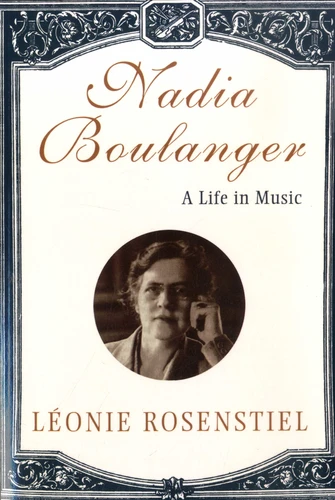Nadia Boulanger. A Life in Music
Par :Formats :
- Paiement en ligne :
- Livraison à domicile ou en point Mondial Relay estimée à partir du 5 décembreCet article sera commandé chez un fournisseur et vous sera envoyé 10 jours après la date de votre commande.
- Retrait Click and Collect en magasin gratuit
- Livraison à domicile ou en point Mondial Relay estimée à partir du 5 décembre
- Réservation en ligne avec paiement en magasin :
- Indisponible pour réserver et payer en magasin
- Nombre de pages427
- PrésentationBroché
- FormatGrand Format
- Poids0.61 kg
- Dimensions15,2 cm × 22,7 cm × 2,7 cm
- ISBN0-393-31713-7
- EAN9780393317138
- Date de parution01/03/1998
- ÉditeurNorton & Company
Résumé
Nadia Boulanger, whose composition students included such luminaries as Aaron Copland, Virgil Thomson, Walter Piston, and Elliott Carter, has been called "the leading music teacher of the twentieth century" (The New Grove Dictionary of Music). Holding court at her American School of Music in Fontainebleau and the nearby Paris Conservatoire, demanding no less from her pupils than perfect musical form and masterly compositional technique, Boulanger helped them gain worldwide recognition and respect for American classical music.
At the age of twenty, Boulanger earned an impressive second place in the Prix de Rome competition for her cantata La sirène, but she subsequently gave up composing and devoted herself to teaching and performing. She became the first woman to conduct the Royal Philharmonic Orchestra of London and the Boston Symphony Orchestra. Boulanger published little during her lifetime, but toward the end of her life she chose Léonie Rosenstiel to write her biography, providing Rosenstiel with her personal papers.
From these sources—and from interviews with colleagues, former pupils, and close friends of Boulanger—Rosenstiel has woven a vivid account of Boulanger's life and music and her role as mentor to some of the greatest musicians of our time.
At the age of twenty, Boulanger earned an impressive second place in the Prix de Rome competition for her cantata La sirène, but she subsequently gave up composing and devoted herself to teaching and performing. She became the first woman to conduct the Royal Philharmonic Orchestra of London and the Boston Symphony Orchestra. Boulanger published little during her lifetime, but toward the end of her life she chose Léonie Rosenstiel to write her biography, providing Rosenstiel with her personal papers.
From these sources—and from interviews with colleagues, former pupils, and close friends of Boulanger—Rosenstiel has woven a vivid account of Boulanger's life and music and her role as mentor to some of the greatest musicians of our time.
Nadia Boulanger, whose composition students included such luminaries as Aaron Copland, Virgil Thomson, Walter Piston, and Elliott Carter, has been called "the leading music teacher of the twentieth century" (The New Grove Dictionary of Music). Holding court at her American School of Music in Fontainebleau and the nearby Paris Conservatoire, demanding no less from her pupils than perfect musical form and masterly compositional technique, Boulanger helped them gain worldwide recognition and respect for American classical music.
At the age of twenty, Boulanger earned an impressive second place in the Prix de Rome competition for her cantata La sirène, but she subsequently gave up composing and devoted herself to teaching and performing. She became the first woman to conduct the Royal Philharmonic Orchestra of London and the Boston Symphony Orchestra. Boulanger published little during her lifetime, but toward the end of her life she chose Léonie Rosenstiel to write her biography, providing Rosenstiel with her personal papers.
From these sources—and from interviews with colleagues, former pupils, and close friends of Boulanger—Rosenstiel has woven a vivid account of Boulanger's life and music and her role as mentor to some of the greatest musicians of our time.
At the age of twenty, Boulanger earned an impressive second place in the Prix de Rome competition for her cantata La sirène, but she subsequently gave up composing and devoted herself to teaching and performing. She became the first woman to conduct the Royal Philharmonic Orchestra of London and the Boston Symphony Orchestra. Boulanger published little during her lifetime, but toward the end of her life she chose Léonie Rosenstiel to write her biography, providing Rosenstiel with her personal papers.
From these sources—and from interviews with colleagues, former pupils, and close friends of Boulanger—Rosenstiel has woven a vivid account of Boulanger's life and music and her role as mentor to some of the greatest musicians of our time.



